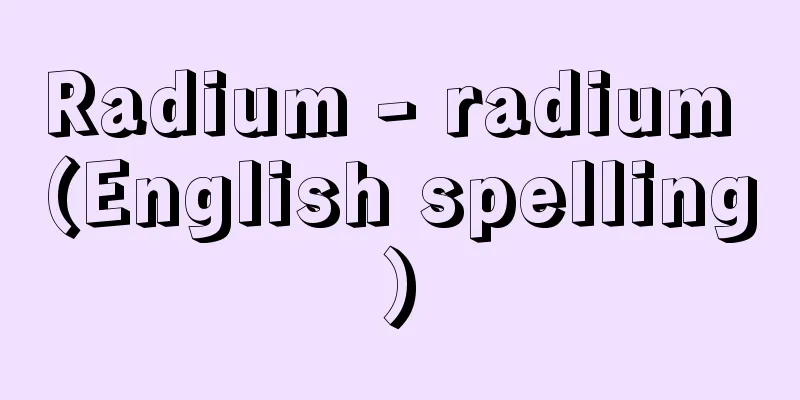Radium - radium (English spelling)

|
It belongs to Group 2 of the periodic table and is one of the alkaline earth metals. It is a typical radioactive element. historyRadium was discovered in uranium ore together with polonium by the French Curies in 1898. It was the first radioactive element, and the method of separation and confirmation at that time was also the first classical example of radiochemical analysis. The name radium comes from the Latin "radius," which means radiation. Radioactivity was first discovered with uranium, but the discovery of radium, which has a much stronger radioactivity than uranium, marked the beginning of full-scale research into radioactivity. [Torii Yasuo] ExistenceThere are four natural isotopes of radium: radium-223 (actinium X, AcX) in the actinium series, radium-224 (thorium X, ThX) in the thorium series, radium-226 in the uranium-radium series, and radium-228 (mesothorium 1, MsTh 1 ) in the thorium series. Radium-226 was discovered by Marie Curie, and is often referred to simply as radium. This is the most important isotope, and is found in all uranium ores; for example, about 200 milligrams are present in one ton of pitchblende. [Torii Yasuo] Manufacturing methodIt is found only in uranium ores; it is separated along with barium, converted to its chloride salt, and then separated from the barium by fractional crystallization or ion exchange resins. [Torii Yasuo] natureA metal with a white luster. It resembles barium but is more volatile than barium. When exposed to air, its surface turns black. It reacts with water to become radium hydroxide and generate hydrogen. When it comes into contact with oxygen, it becomes an oxide. It generally exhibits properties similar to those of other alkaline earth metal elements, but is more violent. Its flame color reaction is red. [Torii Yasuo] ApplicationsRadium-226 has a half-life of 1,590 years and is used as an ideal standard for radioactivity. It has been used as a gamma ray source in medicine and industrial radiography, but other inexpensive artificial radioisotopes have recently come to be used. [Torii Yasuo] [References] | [Supplementary Materials] |©Shogakukan "> Periodic Table Source: Shogakukan Encyclopedia Nipponica About Encyclopedia Nipponica Information | Legend |
|
周期表第2族に属し、アルカリ土類金属元素の一つ。代表的な放射性元素である。 歴史1898年にフランスのキュリー夫妻によってポロニウムとともにウラン鉱石から発見された。放射性元素として最初のものであり、そのときの分離確認の方法は、放射化学分析の最初の古典的実例でもある。ラジウムの名称は、放射線を意味するラテン語radiusにちなんだものである。放射能の発見はウランについて初めてなされたものであるが、ウランよりはるかに強い放射能をもつラジウムの発見は放射能に関する本格的研究の端緒となった。 [鳥居泰男] 存在天然には、アクチニウム系列のラジウム223(アクチニウムX、AcX)、トリウム系列のラジウム224(トリウムX、ThX)、ウラン・ラジウム系列のラジウム226、トリウム系列のラジウム228(メソトリウム1、MsTh1)の4種の同位体が存在する。キュリー夫妻によって発見されたものはラジウム226で、単にラジウムというときはこれをさすことが多い。これは同位体中もっとも重要なもので、すべてのウラン鉱石中に含まれており、たとえばピッチブレンド1トン中には約200ミリグラム存在する。 [鳥居泰男] 製法ウラン鉱石にだけ含まれるもので、バリウムとともに分離し、さらに塩化物に変えたのち、分別結晶法またはイオン交換樹脂によってバリウムから分離する。 [鳥居泰男] 性質白色の光沢をもつ金属。バリウムに似ているがバリウムより揮発性が大きい。空気中に置くと表面は黒化する。水と反応して水酸化ラジウムとなり水素を発生する。酸素に触れれば、酸化物となる。一般的にほかのアルカリ土類金属元素と類似の性質を示すといえるが、それらより激しい。炎色反応は紅色。 [鳥居泰男] 用途ラジウム226は半減期1590年で、放射能の理想的な標準として用いられる。なおγ(ガンマ)線源として医療や工業的ラジオグラフィーなどに用いられてきたが、最近ではほかの安価な人工放射性同位体が用いられるようになっている。 [鳥居泰男] [参照項目] | [補完資料] |©Shogakukan"> 周期表 出典 小学館 日本大百科全書(ニッポニカ)日本大百科全書(ニッポニカ)について 情報 | 凡例 |
<<: Rachel - Rachel (English spelling)
>>: Radian - Rajian (English spelling) radian
Recommend
Dumani
…Attempts were made from the southwest side in 19...
Green worm (Green worm) - Green worm (English spelling) Lineus fuscoviridis
A nemerte of the Acanthodidae family (illustration...
Anshan
A prefecture-level city in the central Liaoning P...
van Lint, L.
...Speaking of tradition, since both realistic re...
Shojoji Temple
Located in Yokogoshi-cho, Sabae City, Fukui Prefe...
Boushi entry specification - Boushi entry specification
A record of ships sent to Ming China in the mid-Mu...
Hart, RW
…In insects, the life span varies depending on wh...
Pauson, PL
...Many new types of organometallic compounds wer...
sacred lotus
…It seems to have been introduced to Japan from t...
Tockus deckeni (English spelling)
… The breeding patterns of hornbill birds are uni...
Rochow, EG
...Industrially important fluorine compounds such...
Embalming
Techniques such as disinfection, embalming, and ma...
Birth - Shussan (English spelling) Parturition
Childbirth is the act of giving birth, and medica...
Dīr al-Baḥī (English spelling) Diral Bahi
...[New square man]. . … *Some of the terminology...
Pinar del Río (English spelling)
The capital of the province of the same name in we...









